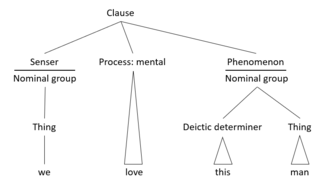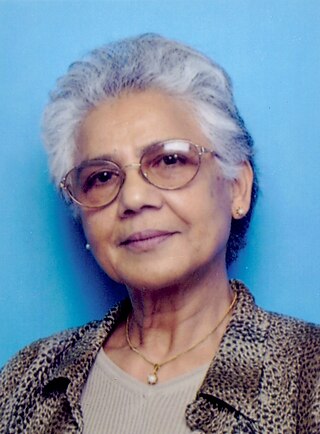Related Research Articles

Functional linguistics is an approach to the study of language characterized by taking systematically into account the speaker's and the hearer's side, and the communicative needs of the speaker and of the given language community. Linguistic functionalism spawned in the 1920s to 1930s from Ferdinand de Saussure's systematic structuralist approach to language (1916).
The following outline is provided as an overview and topical guide to linguistics:

Michael Alexander Kirkwood Halliday was a British linguist who developed the internationally influential systemic functional linguistics (SFL) model of language. His grammatical descriptions go by the name of systemic functional grammar. Halliday described language as a semiotic system, "not in the sense of a system of signs, but a systemic resource for meaning". For Halliday, language was a "meaning potential"; by extension, he defined linguistics as the study of "how people exchange meanings by 'languaging'". Halliday described himself as a generalist, meaning that he tried "to look at language from every possible vantage point", and has described his work as "wander[ing] the highways and byways of language". But he said that "to the extent that I favoured any one angle, it was the social: language as the creature and creator of human society".

Systemic functional grammar (SFG) is a form of grammatical description originated by Michael Halliday. It is part of a social semiotic approach to language called systemic functional linguistics. In these two terms, systemic refers to the view of language as "a network of systems, or interrelated sets of options for making meaning"; functional refers to Halliday's view that language is as it is because of what it has evolved to do. Thus, what he refers to as the multidimensional architecture of language "reflects the multidimensional nature of human experience and interpersonal relations."
In linguistics, the topic, or theme, of a sentence is what is being talked about, and the comment is what is being said about the topic. This division into old vs. new content is called information structure. It is generally agreed that clauses are divided into topic vs. comment, but in certain cases the boundary between them depends on which specific grammatical theory is being used to analyze the sentence.
Rodney D. Huddleston is a British linguist and grammarian specializing in the study and description of English.

Systemic functional linguistics (SFL) is an approach to linguistics, among functional linguistics, that considers language as a social semiotic system.
In linguistics, the term lexis designates the complete set of all possible words in a language, or a particular subset of words that are grouped by some specific linguistic criteria. For example, the general term English lexis refers to all words of the English language, while more specific term English religious lexis refers to a particular subset within English lexis, encompassing only words that are semantically related to the religious sphere of life.

In systemic functional grammar (SFG), a nominal group is a group of words that represents or describes an entity, for example The nice old English police inspector who was sitting at the table with Mr Morse. Grammatically, the wording "The nice old English police inspector who was sitting at the table with Mr Morse" can be understood as a nominal group, which functions as the subject of the information exchange and as the person being identified as "Mr Morse".
Linguistics is the scientific study of language. Linguistics is based on a theoretical as well as a descriptive study of language and is also interlinked with the applied fields of language studies and language learning, which entails the study of specific languages. Before the 20th century, linguistics evolved in conjunction with literary study and did not employ scientific methods. Modern-day linguistics is considered a science because it entails a comprehensive, systematic, objective, and precise analysis of all aspects of language – i.e., the cognitive, the social, the cultural, the psychological, the environmental, the biological, the literary, the grammatical, the paleographical, and the structural.

Ruqaiya Hasan was a professor of linguistics who held visiting positions and taught at various universities in England. Her last appointment was at Macquarie University in Sydney, from which she retired as emeritus professor in 1994. Throughout her career she researched and published widely in the areas of verbal art, culture, context and text, text and texture, lexicogrammar and semantic variation. The latter involved the devising of extensive semantic system networks for the analysis of meaning in naturally occurring dialogues.

James Robert Martin is a Canadian linguist. He is Professor of Linguistics at The University of Sydney. He is the leading figure in the 'Sydney School' of systemic functional linguistics. Martin is well known for his work on discourse analysis, genre, appraisal, multimodality and educational linguistics.

Christian Matthias Ingemar Martin Matthiessen is a Swedish-born linguist and a leading figure in the systemic functional linguistics (SFL) school, having authored or co-authored more than 100 books, refereed journal articles, and papers in refereed conference proceedings, with contributions to three television programs. One of his major works is Lexicogrammatical cartography (1995), a 700-page study of the grammatical systems of English from the perspective of SFL. He has co-authored a number of books with Michael Halliday. Since 2008 he has been a professor in the Department of English at the Hong Kong Polytechnic University. Before this, he was Chair of the Department of Linguistics at Macquarie University in Sydney.
The term metafunction originates in systemic functional linguistics and is considered to be a property of all languages. Systemic functional linguistics is functional and semantic rather than formal and syntactic in its orientation. As a functional linguistic theory, it claims that both the emergence of grammar and the particular forms that grammars take should be explained "in terms of the functions that language evolved to serve". While languages vary in how and what they do, and what humans do with them in the contexts of human cultural practice, all languages are considered to be shaped and organised in relation to three functions, or metafunctions. Michael Halliday, the founder of systemic functional linguistics, calls these three functions the ideational, interpersonal, and textual. The ideational function is further divided into the experiential and logical.
Cryptotype or covert categories of a language is a concept coined by Benjamin Lee Whorf which describes semantic or syntactic features that do not have a morphological implementation, but which are crucial for the construction and understanding of a phrase. The cryptotype is understood in opposition to the phenotype or overt category, namely a category that is overtly marked as such. Covert categories affect words' combinative power.

In linguistics, the term formalism is used in a variety of meanings which relate to formal linguistics in different ways. In common usage, it is merely synonymous with a grammatical model or a syntactic model: a method for analyzing sentence structures. Such formalisms include different methodologies of generative grammar which are especially designed to produce grammatically correct strings of words; or the likes of Functional Discourse Grammar which builds on predicate logic.

The cline of instantiation is a concept in systemic functional linguistics theory. Alongside stratification and metafunction, it is one of the global semiotic dimensions that define the organization of language in context.
The idea of language as a linguistic system appears in the linguistic theory of Ferdinand de Saussure, J.R. Firth, Benjamin Lee Whorf, Louis Hjelmslev, and Michael Halliday.
Alice Marie-Claude Caffarel-Cayron is a French-Australian linguist. She is an Honorary Senior Lecturer in Linguistics at the University of Sydney. Caffarel is recognized for the development of a Systemic Functional Grammar of French which has been applied in the teaching of the French language, Discourse analysis and Stylistics at the University of Sydney. Caffarel is recognised as an expert in the field of French Systemic Functional Linguistics (SFL).
In linguistics, stratification is the idea that language is organized in terms of hierarchically ordered strata. This notion can be traced back to Saussure's dichotomy between signified and signifier and Hjelmslev's expression plane and content plane, but has been explicictly explored as a theoretical concept in stratificational linguistics and systemic functional linguistics.
References
- ↑ Thibault, Paul J.; van Leeuwen, Theo (1996-04-01). "Grammar, society, and the speech act: Renewing the connections". Journal of Pragmatics. 25 (4): 561–585. doi:10.1016/0378-2166(95)00058-5. ISSN 0378-2166.
- 1 2 Halliday, M.A.K. 1961. Categories of a Theory of Grammar. Word, 17 No. 3. p267
- ↑ In M.A.K. halliday and R. Fawcett (eds) New Developments in Systemic Linguistics, Volume 1: Theory and Description. London: Frances Pinter. pp184-212.
- ↑ Pearce, Michael (2012-09-10). The Routledge Dictionary of English Language Studies (PDF). doi:10.4324/9780203698419. ISBN 9780203698419.
- ↑ Sinclair, John McHardy, 1933- (2004). Trust the text : language, corpus and discourse. Routledge. ISBN 0-415-31767-3. OCLC 442960047.
{{cite book}}: CS1 maint: multiple names: authors list (link) CS1 maint: numeric names: authors list (link)